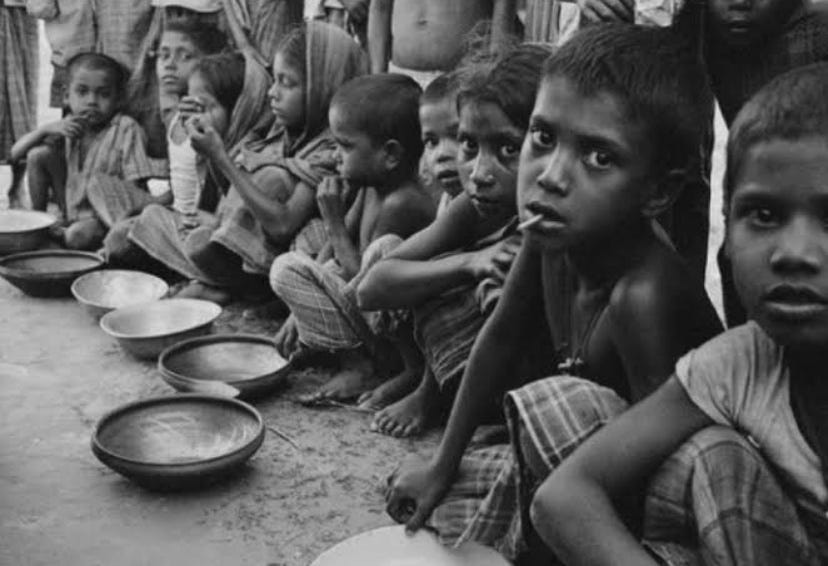Why Do People Starve?
Our wonderful global supply chain is not just failing to prevent hunger, it's causing it.
The body devours itself in the hunt for sustenance, depleting energy levels and producing side effects like anemia and chronic diarrhea. Then the muscles begin to waste, The victim becomes increasingly weak, and then dies.
The world’s farmers produce more than enough to feed the world, and yet people starve. Why?
According to the UN, 688 million people went hungry on a regular basis, up from 628.9 million in 2014. The curve is not sharp, but if current trends continue, more than 840 million people may be undernourished by 2030.
Unlike expected, starvation isn't just exclusive to the mantra of Crisis, Climate, and Poverty which is commonly seen in countries like Afghanistan, Syria, and Yemen. These just happen to be bleak predictions of future hunger. They don’t really explain starvation today. There is also an economic factor that nobody talks about.
Venezuela’s cratering economy; South Africa’s high unemployment rates; Brazil’s years of austerity. Even in the "greatest country in the world!, in the state of Mississippi, the USA", one in every four children is unable to consistently get enough to eat.
It's hard to comprehend that even though the global food system has undergone miraculous technological revolutions in the industrial age such as Mechanisation, Biochemistry & Gmo. It still hasn't been able to prevent people from dying the most agonizing death possible.
For that, we have to look at a different unexpected aspect of the 20th-century farming revolution: the fact that it didn’t happen everywhere.
Abundance is the problem!
“Most of modern life, all our diseases, are diseases of abundance, not diseases of scarcity.”
After the Second World War, most of the nations were bankrupt, to kickstart the economy which was largely agricultural by then, they needed to subsidize the farmers.
This plan worked and farmers in industrially developed countries started to produce a record number of outputs. But there soon occurred one problem.
You see our human behavior is perfectly evolved to sustain any scarcity of resources. It is only when we happen to have more of something, problems kick in.
Similarly, highly subsidized farmers of Europe and America had one serious problem: Excess of Crops.
Therefore to solve this problem they did what the west always does, offload their grievance to the third-world countries.
Take Europe’s sugar-beet growers, for example, Their national governments subsidized them to get back on their feet. That worked, but once industrialization kicked in and production levels reached the stratosphere, they had an excess. The answer was to export that food, but the subsidies had the effect of artificially lowering prices: British sugar farmers could sell their goods in global markets and undercut the competition. This was good news for Europeans, but terrible news for sugar producers like Zambia. Farmers were locked into subsistence or decided to turn away from the foods that they were naturally able to produce in favor of other products.
It didn't happen everywhere!
Just as healthy calories are hard to come by for those who are poor, the industrialization of farming is unevenly distributed.
First Western farmers were catapulted into hyper-productivity, then the nations touched by the Green Revolution. But progress stopped there.
Today, a hectare of farmland in sub-Saharan Africa produces just 1.2 metric tons of grain each year; in the US and Europe the equivalent land yields up to eight metric tons. This is not because farmers in poorer regions lack the natural resources, necessarily (West Africa has long been a producer of cotton), but because they are locked into a cycle of subsistence.
They haven’t industrialized, so they don’t grow much food, which means they can’t make much money, so they can’t invest in equipment, which means they can’t grow much food. The cycle continues.
Powerful nations today continue to subsidize their farmers and distort global markets and force weaker countries to drop protections. In 2020, the US spent $37 billion on such subsidies and Europe spent $65 billion.
Life isn't fair to all, at all
You can call me a Sceptic or a Chomsky-fan but one thing I certainly believe is that nothing in our Social, Political & Economical system happens due to natural chance, rather they happen to be after-effects of the game the big guys play!
Whether it’s the popularity of diamonds, brushing with toothpaste, or eating cereals for breakfast. All of these behaviours are a result of genius marketing gimmicks made by big corporations to pump more and more profits.
Since Capitalism is the prevailing ideology of our times, The world is unevenly distributed in favor of big corporations & institutions.
It should be obvious by now that those who walk in the real corridors of power are Capitalists and not Politicians. Therefore even the most authoritative politician, Vlad Putin, should be merely seen as a showstopper for a communist movie that is secretly directed by mighty Russian Oligarchs!
End.
The goal is to kindle a sense of curiosity in you, not to give you answers and become another information source.
If you've been reading my posts every Sunday, you must have realized by now that my goal is never to give a standard answer to my readers, instead, I staunchly believe that one good question is worth a hundred good answers.
Until Next Sunday!
Yash.





